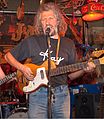| This article needs additional citations for verification. Please help improve this article by adding citations to reliable sources. Unsourced material may be challenged and removed. Find sources: "Harmony Company" – news · newspapers · books · scholar · JSTOR (October 2017) (Learn how and when to remove this message) |
| [REDACTED] | |
| Company type | Private |
|---|---|
| Industry | Musical instrument |
| Founded | 1892; 133 years ago (1892) |
| Founder | Wilhelm Schultz |
| Fate | Company ceased in 1975; "Harmony" brand relaunched in 2018 |
| Headquarters | United States |
| Products |
|
| Owner | Vista Musical Instruments |
| Website | harmony.co |
The Harmony Company is a former guitar manufacturing company that is currently a brand owned by Singapore-based BandLab Technologies. Harmony was, in its heyday, the largest musical instrument manufacturer in the United States. It made many types of string instruments, including ukuleles, acoustic and electric guitars and violins.
The company ceased in 1975, with the "Harmony" brand being relaunched by BandLab in 2018 to produce electric guitars and amplifiers.
History

Harmony was founded in 1892 by Wilhelm Schultz. In 1916, Sears, Roebuck and Co. purchased it, in part to corner the ukulele market. At the time Harmony was led by Joe Kraus, who was chairman until 1940.
In 1928, Harmony introduced the first of many Roy Smeck models, and went on to become the largest producer in the U.S. They sold 250,000 pieces in 1923 and 500,000 in 1930, including various models of guitars, banjos, and mandolins.
In the late 1930s, the firm began making violins again after a 19-year hiatus. They also bought brand names from the bankrupt Oscar Schmidt Co.—La Scala, Stella, and Sovereign. They sold not only Harmony products, but instruments under the Sears name, Silvertone, and a variety of trade names—Vogue, Valencia, Johnny Marvin, Monterey, Stella, and others. In 1940, after Kraus had a conflict with management, he left, but then bought enough stock to restart the company independently.
Between 1945 and 1975, the Chicago firm mass-produced about ten million guitars. The company reduced their output over the years, later focusing on student models sold through JCPenney. The Harmony brand peaked in 1964–1965, selling 350,000 instruments, but low-end foreign competition led to the company's demise 10 years later.
The pickups on almost all electric guitars and basses that Harmony produced were manufactured by Rowe Industries Inc. (later known as H.N. Rowe & Company, Rowe DeArmond Inc., and DeArmond Inc.) of Toledo, Ohio. Many of the instrument amplifiers badged with the Harmony name were manufactured by "Sound Projects Company" of Cicero, Illinois.
The Harmony Guitar Company ceased in 1975, and sold the Harmony name. In the early 2000s, an unrelated company, the Westheimer Corp., based in Lake Barrington, Illinois briefly imported "reissue" Harmony guitars.
In 2018, BandLab Technologies claimed to be "relaunching" the Harmony brand with a new series of electric guitars and guitar amps.
Since being bought by BandLab, USA made Harmony Guitars are built in Kalamazoo, Michigan by the Heritage Guitar Company. Heritage Guitars is also owned by BandLab. The brand has since been relaunched with American-made models such as the Rebel and the Jupiter.
Gallery
See also: Harmony Company models-
 1963 Sovereign
1963 Sovereign
(Syd Barrett's 1st guitar) -
 Harmony acoustic
Harmony acoustic
-
 Silvertone model 1219 Buck Owens "American" (1971) by Harmony
Silvertone model 1219 Buck Owens "American" (1971) by Harmony
-
 H1213 Archtone (c.1963)
H1213 Archtone (c.1963)
-
 H15 Bobkat
H15 Bobkat
-
 H19 Silhouette
H19 Silhouette
(Silvertone 1480) -
 H88, H44 StratoTone, compared with travel guitar
H88, H44 StratoTone, compared with travel guitar
-
 H44 StratoTone (played by Per Ängkvist)
H44 StratoTone (played by Per Ängkvist)
-
 H47 StratoTone, modified by guitar tech of Dan Auerbach
H47 StratoTone, modified by guitar tech of Dan Auerbach
-
 H49 StratoTone Jupiter (Silvertone 1423)
H49 StratoTone Jupiter (Silvertone 1423)
-
 H7208 Roy Smeck StratoTone (Airline Roy Smeck StratoTone)
H7208 Roy Smeck StratoTone (Airline Roy Smeck StratoTone)
-
 H53 Rocket
H53 Rocket
-
 H78 3-pickups with Bigsby
H78 3-pickups with Bigsby
-
 H82 Rebel
H82 Rebel
Further reading
- Acoustic Guitars: The Illustrated Encyclopedia. New York: Chartwell Books. 2011. ISBN 978-0-7858-3571-4.
References
- Our Guitars on Harmony website, 14 Oct 2019
- ^ Kohman, Peter Stuart (June 2014). "Journey to the Stratotone! Harmony and the Early Solidbody". Vintage Guitar. pp. 54–60.
- Lectrolab guitar amplifiers
-
"Harmony Guitar Page". Broadway Music Co. Archived from the original on 2012-09-23.
In 1975 the Harmony Guitar Co. in Chicago ceased operations and had a huge three-day auction. - NAMM 2018: Harmony resurrected with new guitars and amps on Music Radar, 31 Jan 2018
- BandLab to Reboot Teisco and Harmony Guitar Brands by Carly Smith on Reverb.com, 14 Dec 2017
- "Review: Harmony Standard Series Jupiter and Rebel". Guitar.com | All Things Guitar. 2019-11-05. Retrieved 2021-04-02.
- "Silvertone World - Acoustic Guitars - 1970s - Model 1219 - Buck Owens American".
- Zachary Fjestad. "Harmony Archtone H1213". Premier Guitar (Dec 2011). Archived from the original on 2012-11-16. Retrieved 2013-05-07.
- "The Black Keys - Dan Auerbach Guitar Gear Rig". UberProAudio.com.
Harmony Stratotone H47 (Lindy Fralin P-90 pickups)
- Chris Kies (2014-09-11). "Rig Rundown: The Black Keys' Dan Auerbach (2014)". Premier Guitar.
Auerbach's '60s Harmony Stratotone has been a longtime member of his arsenal. Once he acquired it, the guitar had a its bridge P-90 re-wound by Lindy Fralin. It's kept in open-G tuning for "Run Right Back."
See also interview video and transcription:- Premier Guitar (2012-04-03). "Rig Rundown - The Black Keys' Dan Auerbach" (interview video). YouTube.
- "Dan Auerbach - Harmony Stratotone Electric Guitar". equipboard.com. 2014.
- "1962 Harmony Roy Smeck Stratotone Model H7208". Traynor Tweaks (kilback.net). Archived from the original on 2015-04-02. Retrieved 2015-03-10.
Manufactured by Harmony in Chicago, USA, in mid-1962. Similar to Harmony Stratotone H49 Jupiter, but different pickups and controls.
External links
- Official website
- Harmony at National Music Museum
| Mandolin | |
|---|---|
| General topics | |
| Family instruments | |
| Manufacturers | |
| BandLab Technologies | |
|---|---|
| Current assets | |
| Former assets |
|